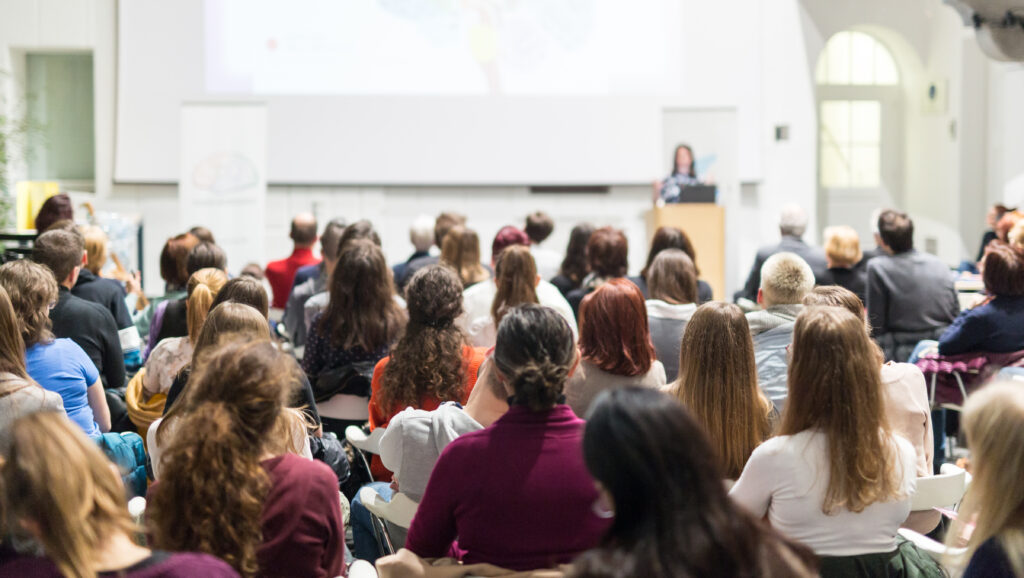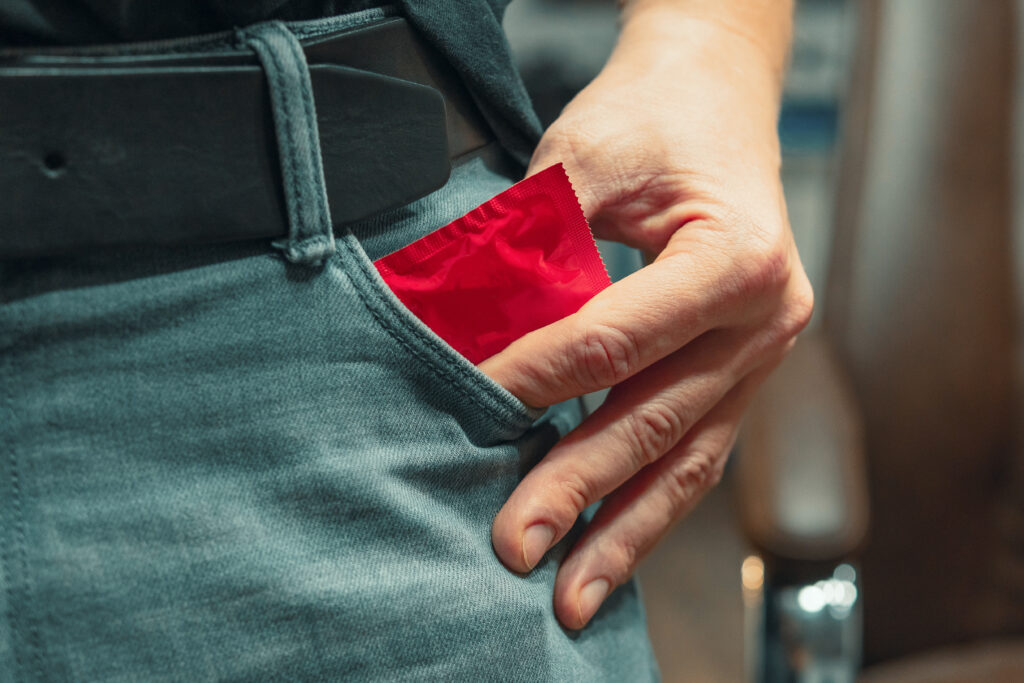Like with most things, the Dutch have adopted a direct, no-nonsense way around sex education in the Netherlands. Of course, that’s very different from sex education in America.
The Dutch are generally open and liberal when it comes to these sorts of subjects — and sex is definitely not taboo here. The approach to sexual education in America can be quite a shock when compared to the more liberal Dutch one.
America’s sex education is rather… unique
I remember, at about age 12, being herded into the school auditorium, along with all the other girls my age, and shown a sex education film.
It was about how a girl’s body matures, explaining the menstrual cycle, and how pregnancy occurs. It was all very technical, and it was easy to think the entire thing was something that took place in a lab somewhere. 🔬

We were also instructed on the dangers of sex, especially how it could lead to acquiring any one of a number of nasty diseases. Naturally, I was horrified.
Let me tell you: The American approach is not exactly inspiring to early pubescent youth beginning to explore their sexuality and those awkward first relationships. But that’s how things were taught in the US (if at all).
So, how about sex education in the Netherlands?
The Netherlands has a different attitude toward sex — one that emphasises teaching children that sex is about loving relationships, both with others and with themselves.
Not only that, it can actually be fun — an idea that would shock most US school boards and cause all the Karens to start freaking out.
Either way, sex education in the Netherlands starts at the ripe old age of four, during kindergarten, when children are taught about things such as their bodies, respect, and consent. Of course, this all happens in an age-appropriate manner: with lots of books, images, and great teachers. 👇
Needless to say, when I got a notice from my 7-year-old daughter’s Dutch school that the following week’s theme was to be Lentekriebels (Spring Fever), I was excited. It reminded me of one more reason I love living in the Netherlands.
Rather than sticking their heads in the sand and advocating abstinence-only — a policy that has been proven to be a dismal failure — the Dutch realise that human sexuality is a perfectly natural part of life.
They also realise that the more resources children are equipped with, the better off they will be. That’s why open conversations are encouraged across all ages — in and outside of the classroom. 🤗
Dutch parenting and views on sex education at home
Sex education in the Netherlands is viewed as a combined effort between the youth’s school and the parents.
Unlike the days of my youth, most Dutch teens feel able to speak openly with their parents about sex. They do not have to resort to sneaking around behind their parents’ backs, reduced to awkward fumbling in the back of dad’s car.

It’s also not uncommon in a Dutch household to find your daughter or son’s partner sitting at the breakfast table in the morning. Two-thirds of teens between 15 and 17 report that their parents allow their steady partners to share their bedroom for an overnight stay.
As one parent I spoke with put it, “I’d rather have my daughter at home where I can be there for her if she needs me, and I can get to know her boyfriend better.”
Teenage pregnancy rates in the Netherlands
You guessed it: The teenage pregnancy and birth rates in the Netherlands are very low.
In fact, the Netherlands has one of the lowest teen birth rates in the European Union, and only around 2.5 girls per 1,000 aged 15-19 have a baby each year.
In the USA, which has the highest teenage birth rate in the developed world, it is more than 6 times higher than the Netherlands — with 15.4 births for every 1,000 girls aged 15-19.
So yes, it’s obvious that the Dutch approach to sex education is the one that works. 👏🏼

Dutch teens also tend to have their first sexual experience slightly later than their American counterparts. When they do finally have sex, the majority of Dutch report it as having been a positive, fun experience.
In contrast, nearly 70% of American teens say they felt they should have waited longer before having sex.
Why is that? Well, Dutch sex education classes teach children to respect others’ boundaries, stressing the importance of sex in the context of a respectful, loving relationship. One of the earliest lessons revolves around consent.
Children are also taught how to say “no” until they feel they are ready for sex, to decide what and how much they want, to tell their partner what feels good to them, and to act responsibly both in terms of contraception and respect for their partner.
Easy access to contraception an birth control
The Dutch youth is instructed on the use of contraceptives from an early age, and condoms are readily available from vending machines in many public bathrooms, in stores and in schools.
READ MORE | The ultimate guide to gynaecology, birth control, and check-ups in the Netherlands
The result? Teens here have considerably lower rates of sexually transmitted infections compared with the US and Britain. In addition, the contraceptive pill is available for free to any girl under age 21.

Two different views of teenage sexuality
Amy T. Schalet, author of “Not Under My Roof: Parents, Teens, and the Culture of Sex“, a book about the differences between American and Dutch norms in regard to teenage sexuality, indicates the cultural differences between the two countries have something to do with a more mature view of sexuality.
“There’s a real gender component there, and that’s also where the Dutch, I think, do things differently,” she says.
“They leave room for boys to think of themselves as romantic, of having feelings. And it’s not that American boys aren’t romantic, it’s that everything in their culture tells them that they shouldn’t be.”
Dutch sex education also includes topics such as gender identity and homosexuality. Children here learn early that it is perfectly natural for two men or two women to be in love.
I can’t help but think that this type of early training can help prevent the many hate crimes and acts of violence against the LGBTQIA+ community.
In addition to this, no subject regarding sex is taboo in Dutch sex ed classes, particularly in the later grades, where it is not unusual to find discussions on subjects such as masturbation and oral sex.
Girls are not expected to take a passive role in sexual negotiations either. They are taught they can make choices about their own sexuality, and not to feel pressured by boys or their friends.
In fact, Dutch women are known to be very forthright about what it is they want in bed. Girls learn their sexual desires are perfectly natural, and boys are encouraged to embrace their emotions and romantic feelings.
The Dutch model of sex education is a great example of how to deal with the topic. While it might not be applicable everywhere due to cultural barriers, it can still serve as an inspiring example for other nations.
If this sex education model were adopted in other countries, I can only think the world would be a healthier, more satisfying place.
What do you think of all of this? Tell us all about it in the comments below!






Holland just sounds better and better the more I read about it. While some other countries who have potential do nothing except try to win their “sovereignty” back with lame moves like Brexit, Holland actually does amazing things for the country, its people and the environment. After finishing my degree in the UK, I’m highly considering Holland as a place to move. Great job Holland, sounds like an amazing place!
We’re doing something right, even though everybody complains all the time about everything everywhere. Could that be the reason….?? ;-))))
Living in the UK and with a young daughter and teenage son, I just wish the culture was more progressive here.
I would love to find a way to educate my children in a way that is in line with the Dutch way of thinking. Anyone got any resource anywhere?
https://www.rutgers.international/springfever is a good place to start. 😉
this is just clearly the best and most well thought out version of education i can possibly think of. the netherlands always seems to amaze me at every turn
bravo NL
I’m all for education, but speaking as a never-been-a-parent, sounds like Dutch parents are very permissive! (I am thinking in particular about the whole breakfast thing, which seems like it might not be representative.) It is ALSO perfectly natural for parents to set rules (even if kids break them), and it is an essential part of parenting, not to mention beneficial to children (teens included).
I disagree. I travelled through Northern Europe for 6 months staying with new families every 3 to 5 days. The only family that did not feel it was alright for their teen son or daughter to have sex at home was a strict Catholic family I stayed with in Southern Germany. Every parent I spoke to said virtually the same thing. “I know they are going to have sex. I’d rather they have it here where they are safe.” Living in denial does not stop reality.
This is not about rules in general. This is about sexuality. Rules being applicable elsewhere doesn’t mean rules apply to education about sexuality. Rules about e.g. running around the house is not comparable. Running around the house can result in effecting other people. A child’s sexuality doesn’t effect anyone but themself.
I think this is much like talking about beliefs. A parent cannot impose rules on a child about what they are allowed to believe, their beliefs are theirs to figure out.
A parent doesn’t have to believe the same as their child does, but not respecting a child’s freedom to believe what they want is indoctrination. A parent doesn’t have to have an identical sexuality as their child does, but not respecting a child’s freedom to figure out their own sexuality is indoctrination.
“Rules” about what a child is “allowed to believe” is not beneficial.
“Rules” about what a child is “allowed to think about their sexuality” is not beneficial.
This is definitely not going to work with Moslems.
I’m an American with a Dutch Father who has spent every summer of my life till I was 22 years old in the Netherlands. It’s ridiculous to compare sexual violence statistics with the USA considering the landmass and population far surpass Holland in complexity, culture and numbers. Some parts of the USA are more conservative and less open about sexuality while other parts rival the sexual experiences. It may be entirely anecdotal but my Dutch peers were more sexually active and promiscuous than my American friends, and in many cases they took more risks as well.
They comparing per capita.
I am a single gay Mum raising two boys in good old Catholic Ireland.churches run our schools and the sex education is awful. We have our abortion referendum next week but that’s another matter. Anyway, where can I get material on sex education in Netherlands (in English) please? so that I can do the teaching to my boys myself. Thank you
Like a few other commenters, I would also love to get a copy of the curriculum. It’s so important!
I am Dutch and was raised with this system. Since 1993, at age 36, I live in the US. Social worker by profession, I got to work in child welfare, in Ohio and California. I have seen the worst results of the American culture around sex education. Preventing pregnancy is one thing and enjoying sex for both partners and having respect for your body and the other in your relationship are also great rewards of the Dutch system. But I like to break a lance for the effect of the Dutch model on child sexual abuse as well as Domestic Violence. Let’s stop it and copy something like this Dutch system. I know I made a difference in some lives, with my Dutch approach!
I am parenting in America and would love some resources in the application of these themes! My kiddo is 6. 😊
And thank you!
This is shocking me. As a Muslim I am taught to simply lower my gaze to the opposite gender and avoid sex before marriage. With this simple rule, I live safely and peacefully. I dont need to experience teen pregnancy, abortion, sexual disease, and broken hearts from being used by the guy who is not guaranteed to be my husband. I dont need to let a guy using my body then after he is bored he will use another girl’s body to satisfy himself without responsibility. Besides, the postponement of having sex until married leads to the great happiness in marriage. Love starts after marriage, not ends with it. Sorry, i have different opinion with majority here, but frankly I feel so lucky to be a Muslim. The rules of my religion are not made by God to oppress me, but to protect me from sadness and calamity. Thank you for reading and respecting my opinion.
Am not a muslim but I agree with you 150%.
How come every single girl that age is acting more sexual than any country!?